The core of Microsoft Dynamics CRM functionality is relationship management. Users can capture all customer touch points such as phone or email interactions, appointments, exchanged letters, faxes, etc. to generate a single view of the customer.
Microsoft Dynamics CRM has three comprehensive functional modules: Sales, Marketing, and Service (or Customer Care). A key differentiator is the Framework that allows customers and partners to rapidly build Extended CRM applications, also known as xRM applications.
Extended CRM applications can be industry- or vertical-specific solutions, such as citizen or student services management, or they can be any relationship-based applications, such as dealer or vendor management, patent management, employee self-service, and asset management. The core workloads and the extended CRM applications take advantage of a declarative rapid application development framework providing the underlying relationships, interactions, processes and insights.
Key functional modules in Microsoft CRM
Sales: Sell more, faster with Microsoft Dynamics Dynamics CRM
Buying decisions are often made before you can even engage. To win, sales must adapt quickly. By using solutions that are familiar, intuitive, and easy to adopt, your sales team can be more effective in the office or on the go. With Microsoft Dynamics CRM Online, they have exceptional access to social data for lead generation and relationship management to make every customer conversation more relevant, valuable, and productive.
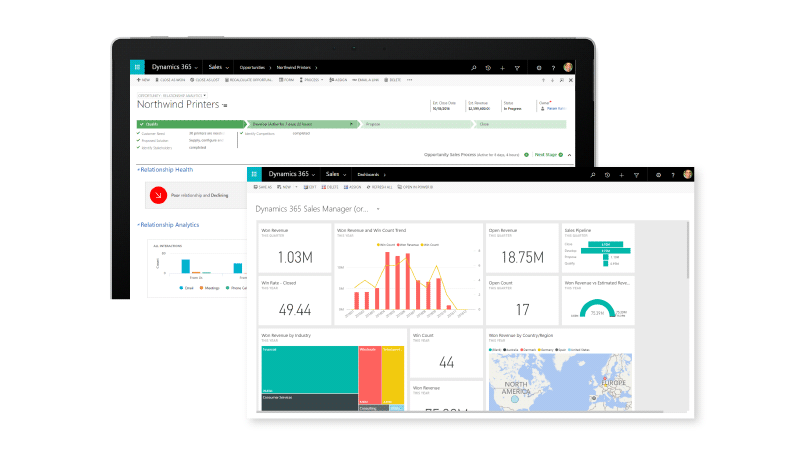
Your sales reps can easily collaborate across teams, geographies, and work groups with instant visibility into their pipeline from anywhere, on any device. Microsoft Dynamics CRM sales automation process includes lead generation, lead-to-opportunity conversion upon qualification, order management, and invoice tracking.
Marketing: Attract, engage, and retain customers with Microsoft Dynamics CRM
In this digital era, marketers need the ability to plan, execute, and measure campaigns easily from start to finish. Microsoft Dynamics helps engage your customers to bring your marketing vision to life by allowing you to accelerate your marketing around one plan that’s as agile as you are.
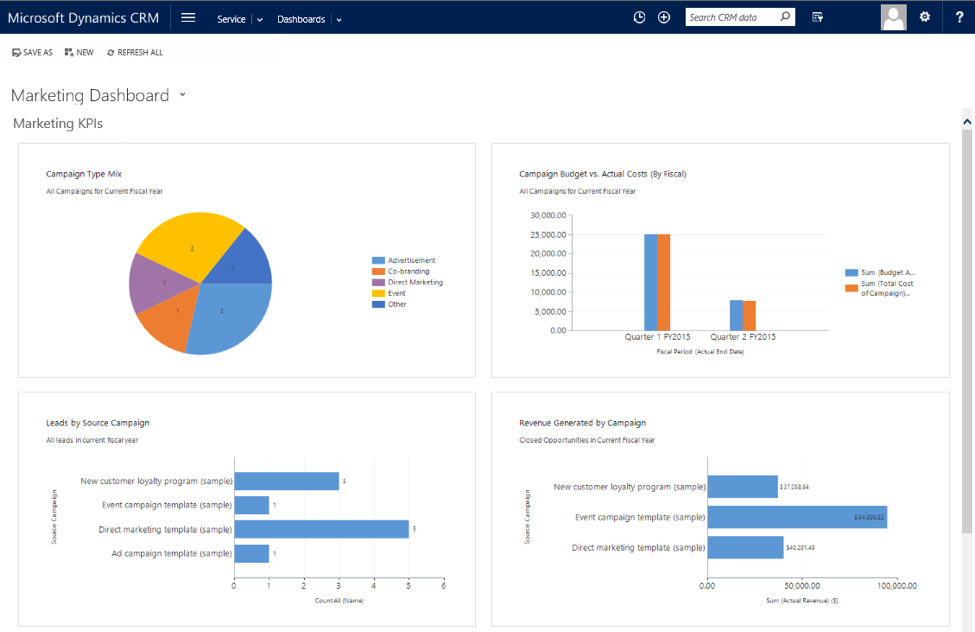
Reduce your time to market, improve brand consistency and message while gaining deep customer insights that help you plan effectively and execute flawlessly. Enterprise-ready collaboration means you work better together—across your team and with other agencies—on brand, content, and events, to stay aligned and agile.
Customer Service: Offer world-class customer service that leads to loyalty
Microsoft Dynamics CRM provides a comprehensive capability for customer service and support to help in order to reduce service response times, improve case resolutions, and increase customer self-service so you can manage and exceed SLAs.
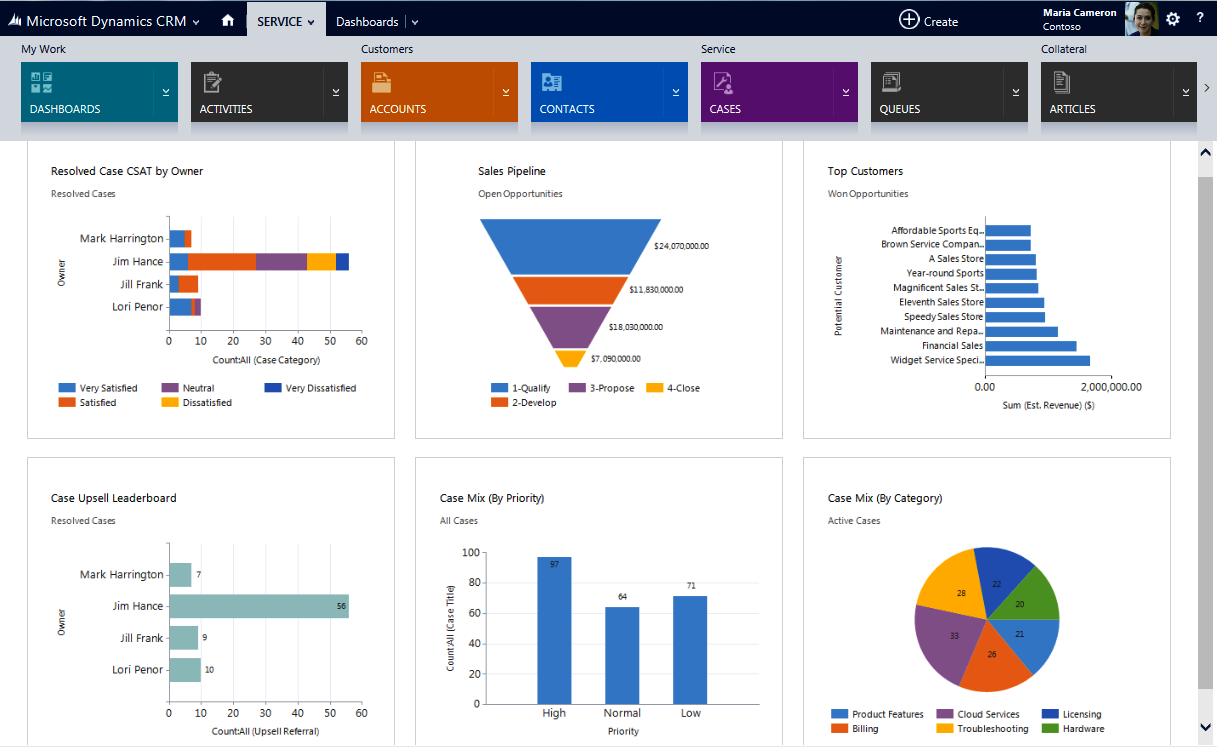
You can deliver responsive, relevant, effective service—anywhere, any time, on any device. Connect with your customers on any channel, provide service on their terms, and empower your teams to move quickly to meet today’s customer expectations.
Social: Get powerful social insights by connecting Microsoft Dynamics CRM to Social Engagement
Turn sentiment into opportunity with Microsoft Social Listening. Monitor brand presence and track strategic initiatives across marketing, sales, and customer service.
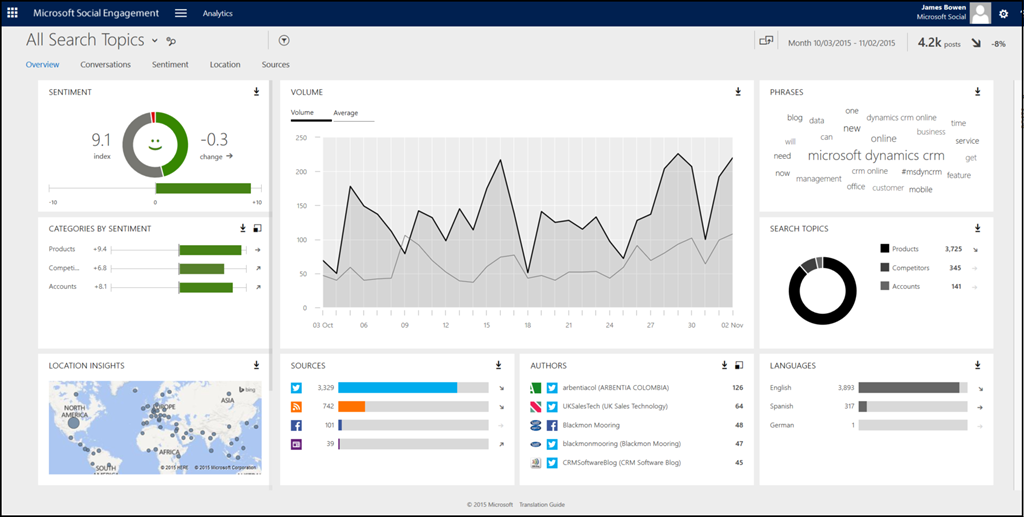
Microsoft Dynamics CRM Online provides social capabilities to help organizations to analyse and act on market intelligence from social conversations, connect with their customers more effectively, drive business agility, foster customer loyalty, and accelerate your organization’s success with social capabilities.
Technical capabilities in Microsoft CRM
Dynamics CRM for phones and tablets
Microsoft Dynamics CRM comes with a native mobile app. CRM entities can be accessed via mobile devices and can be configured to display only key information that is pertinent in the field. Users can view, update, and create CRM data on the move, allowing for increased productivity while working remotely. The Microsoft Dynamics CRM app can be further customised or extended to meet complex requirements.
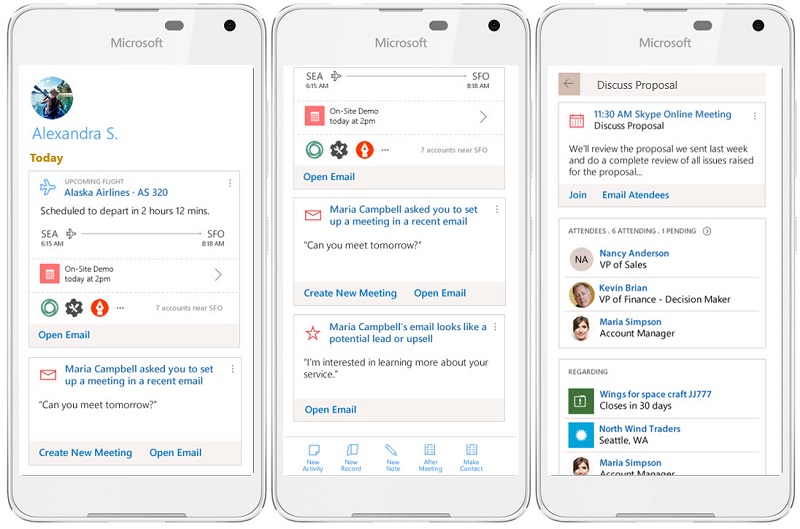
The Microsoft Dynamics CRM mobile app offers offline capability so that the users are able to access and capture important information in the field where the Internet is not available.
Security model & roles
Microsoft Dynamics CRM provides a security model that protects data integrity and privacy and supports efficient data access and collaboration. Key features are listed below.
- e-based security: The role-based security can be leveraged to group sets of privileges together into roles describing the tasks that can be performed by a user or a team. For example, a Team Leader role can be configured to export data out of CRM, an Executive role can be configured to access system-wide data, and an Officer role can be configured to access data that is relevant to his/her department (business unit).
Record-based security: The record-based security can be configured to control user and team rights to perform actions on individual records. This applies to instances of entities (records): The owner of a record can share or grant access to a record to another user or team. - Field-level security: The field-level security can be configured to restrict access to specific high business impact fields in an entity only to specified users or teams.
- Form-based security: The form-based security can be configured to allow or restrict access to specific form(s) exposing relevant information to users or teams. This security configuration can be utilised to streamline data exposure for better user experience and to control whether any web control is to be exposed.
Reporting
Microsoft Dynamics CRM reporting capability leverages the flexible and robust SQL Server portfolio of products to create, analyse, process, and render reports. There are several ways to view the relevant data using the features supplied with the product, which include some of those described in this section. Descriptions of the supporting components that are available with Microsoft SQL Server and Dynamics CRM demonstrate the possibility for reports and more detailed analysis in the future.
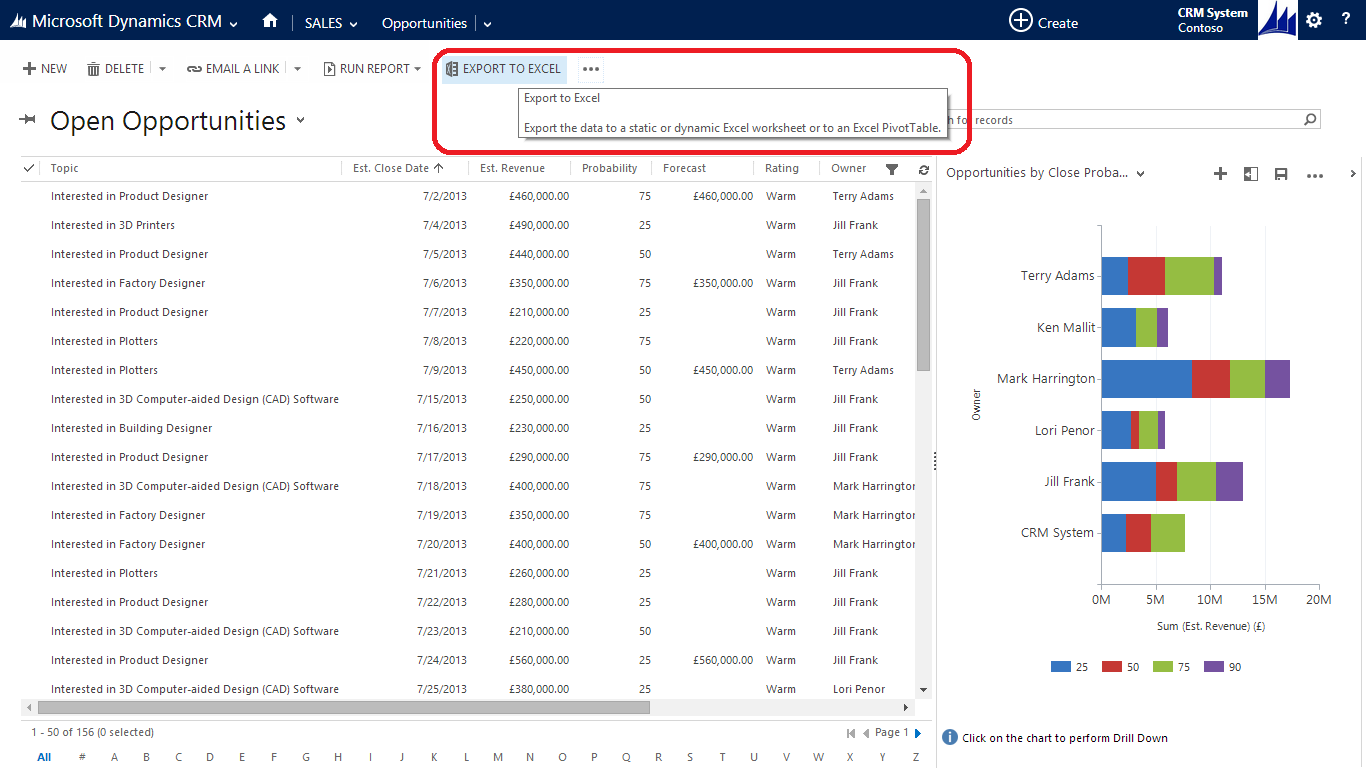
Microsoft SQL Server Reporting Services:
- SSRS provides a rich reporting platform to allow for the incorporation of Business Intelligence dashboards and customer analytics through a standard, easy-to-use interface. Reports access the data from CRM by adhering to the security role assigned to the user running the report and provide standard export options for further processing or distribution, such as PDF, TIFF, and Excel.
- Report Wizard: The Report Wizard can be used by the CRM user to create a new, rich SSRS report. The wizard helps to group and summarise data, creates charts and tables, and generates an easily printable report. The Report Wizard is ideal for users generating their own reports where a specific representation is required that may not be available through the available reports.
- Advanced Find: An extremely powerful client productivity feature, Advanced Find can be used by any CRM User to use the visual Point-and-Click Query Tool to report on customer data. These results can then be saved as Personal Saved Views, which are accessible from the standard views filter within the CRM form. In addition, these views can be shared with teams or colleagues or exported to Microsoft Excel.
- Export to Excel: The results of an advanced find returned to the user can be exported to a static or dynamic Microsoft Office Excel worksheet or a PivotTable for further analysis.
- Filtered Views: CRM data is exposed for reporting purposes using Filtered Views, which makes setting up and running the report easy, while maintaining the security of the logged in user. These views are accessible (read-only) with any ODBC-compatible tool, such as Microsoft Query or Microsoft Excel.
- Mail Merge: Native CRM interaction with the Mail Merge features Microsoft Word, allowing the generation of merged documents from a standard template.
System integration
Microsoft Dynamics CRM includes a comprehensive software development kit (SDK) and application programming interface (API) that can be used to extend and customize the system to meet unique business requirements and connect to other technologies (or systems) via web services; this reduces operational costs and provides fast access to business functionality or data residing in Microsoft Dynamics CRM. The SDK includes guidance and code samples for advanced integrations with Microsoft Dynamics CRM and for developing plug-ins and web services-enabled technologies for extension/integration.
Web services in Microsoft Dynamics CRM use a common integration framework to connect across business systems, applications, and processes. You can take advantage of the UI extensibility using web resources and buttons that can call external systems within Microsoft Dynamics CRM for data persistence. Microsoft Dynamics CRM offers several programming paradigms designed to give you the flexibility to decide what works best for your integration needs. Microsoft Dynamics CRM provides a strong set of APIs and support for XML web services (SOAP and WSDL) and REST. These web services are either directly consumed for data exchange or via an Enterprise Service Bus (ESB) to orchestrate a process. The key web services for system integration are listed below.
Web API
The Web API is new for Microsoft Dynamics CRM Online 2016 Update and Microsoft Dynamics CRM 2016 (on-premises) and provides parity with the Organisation service (see below). The Web API provides a development experience that can be used across a wide variety of programming languages, platforms, and devices. The Web API implements the OData (Open Data Protocol), version 4.0, an OASIS standard for building and consuming RESTful APIs over rich data sources. You can learn more about this protocol at http://www.odata.org/. Details about this standard are available at https://www.oasis-open.org/standards#odatav4.0. Because the Web API is built on open standards, Microsoft does not provide assemblies for a specific developer experience. You can compose HTTP requests for specific operations or use third-party libraries to generate classes for whatever language or platform you want. You can find a list of libraries that support OData version 4.0 at http://www.odata.org/libraries
Organisation service
The Organisation service, also sometimes known as the “SOAP endpoint,” has been available since Microsoft Dynamics CRM 2011. It’s the web service that most developers working with Microsoft Dynamics CRM are already familiar with. The Organisation service is optimized for use with .NET. The Microsoft Dynamics CRM SDK provides a set of assemblies and tools to allow you to generate strongly typed classes and proxies that streamline the development process and enjoy a better development experience using Microsoft Visual Studio. If there are no requirements to support other platforms, you don’t have to move to the Web API right away. Business logic that runs in plug-ins or workflow assemblies on the server expects to use the Organisation service. Input and output parameters use specific classes defined with the assemblies that support the Organisation service.
Single sign on
Microsoft Dynamics CRM supports claims-based authentication using federated identity technologies and Active Directory Federation Services (ADFS) can be used to authenticate the CRM online users. This technology helps simplify access to applications and other systems by using an open and interoperable claims-based model that provides user access with single sign-on to applications on-premises, cloud-based, and even across organizations. Microsoft Dynamics CRM Online has the capability to use any standards-based authentication provider, including Active Directory Federation Services (ADFS), that supports LDAP.
What is Microsoft CRM Portals?
Microsoft Dynamics CRM and CRM Portal (ADX Studio) are tightly integrated within Office 365 Microsoft Cloud, Microsoft has enabled easy exposure of CRM data in the portal by co-locating them under Office 365 environment. CRM Portals supercharge Dynamics CRM into an interactive, web-based sales, services, support, and social engagement platform with dozens of apps and pre-configured portal websites. Users will have to register first and then they can use their valid credentials to access their personal and account details for self-service. This also applies to retail customers, commercial customers, and suppliers.
The traditional CRM implementation includes relevant business processes in which internal CRM users connect for sales, service, project and marketing purposes. With customers engaging through various methods such as email, phone, in person, social, and web and because users increasingly prefer engaging with organizations through the web and mobile, the opportunity for CRM to play a central role in all these interactions is tremendous.
Providing a web portal interface takes these user trends and brings any engagement, including partner and employee scenarios, directly into CRM to create a modern connected experience for both external users and internal business operations. CRM portal brings the customers, employees, or partners into the business processes by surfacing Dynamics CRM data to the web. Enabling portal users and internal CRM users to work together with self-service capabilities maximizes the productivity of every interaction. This allows for businesses to scale their operations as they reduce call center costs, manual processing, and resolution times while at the same time improving end user satisfaction, transparency, and scale of operations.
Microsoft Dynamics CRM Online is becoming Microsoft Dynamics 365
Microsoft has unified all of its business applications, breaking down the artificial silos of ERP and CRM to deliver new purpose-built applications in the cloud.
These applications work seamlessly together to manage specific business processes across sales, customer service, field service, operations, project service automation, and marketing. Microsoft Dynamics 365 is designed to harness the power of One Microsoft. Data has become the new currency and organizations create and have access to more of it.
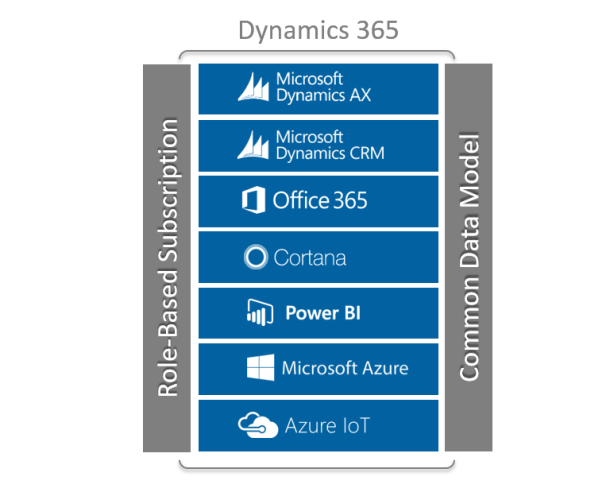
The challenge is how to transform it into intelligence that generates action and drives outcomes. Dynamics 365 will allow organizations to adopt individual business apps such as marketing, sales, service, and operations but, as organizations adopt more of the apps, synergies will be unleashed in the form of ‘Intelligent Business Processes’. This will help proactively guide employees and customers to generate optimal outcomes. The fact is that the classic delineation between CRM and ERP has created a separation in data and processes. Dynamics 365 breaks down this separation.
